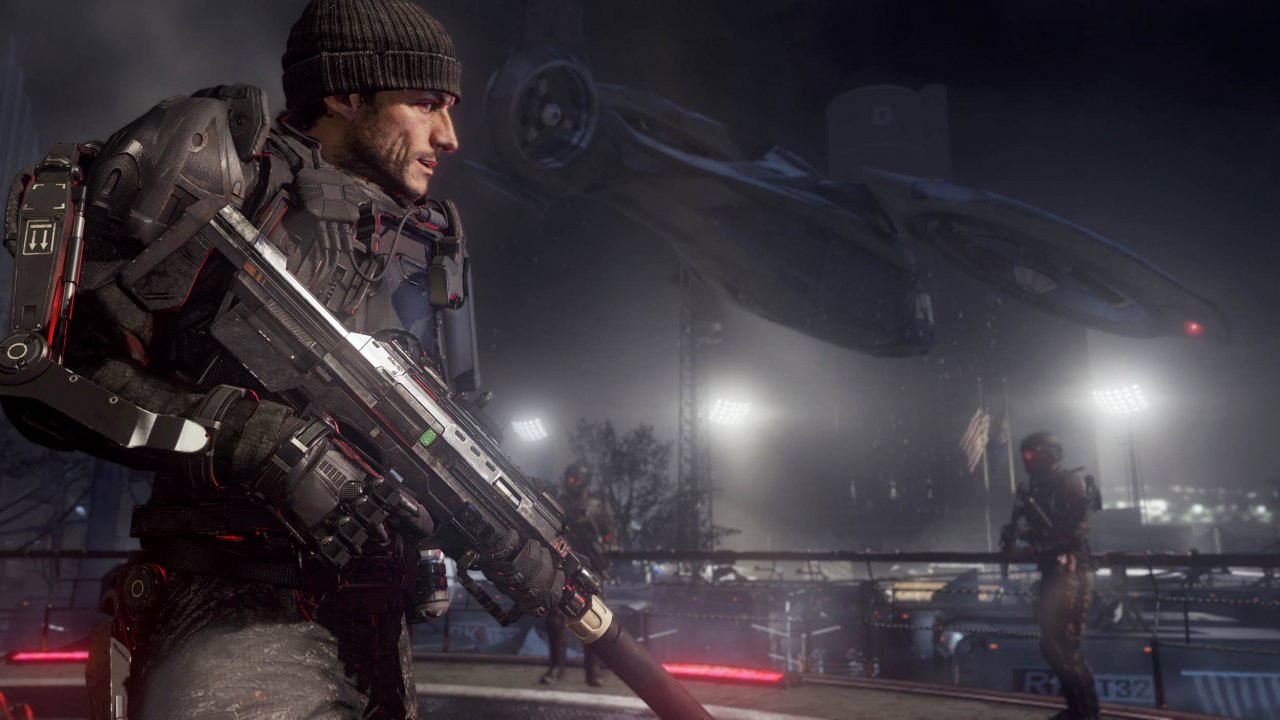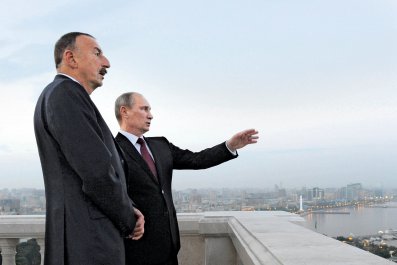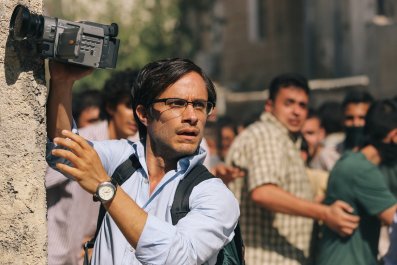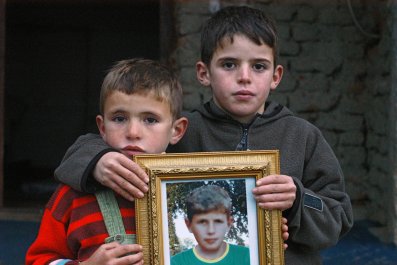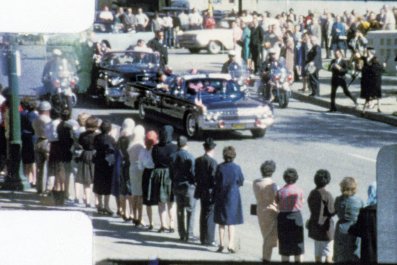In the first hour, I was bewildered. In the fervid depths of the second hour, I grew emboldened, as my shots connected and bad guys were dispatched to the underworld. By the third hour I may have gotten a little hubristic, then, finally, frustrated at my stalled rescue of a Nigerian president, which involved jumping from bus to bus and, finally, taking out a jeep while hanging with one arm from a speeding bus. Fighting evil, it turns out, is an exhausting enterprise, for one's retinas and one's thumbs especially.
Then it was dusk, and, down below, the workaday crowds of lower Manhattan shuffled toward subways through labyrinthine passageways. Soon I would join them, for my wife and daughter awaited at home in peaceful old brownstone Brooklyn. They did not know that, hours before, I, as one Private Jack Mitchell, had enlisted in the Marine Corps and, after a bloody mission in South Korea, had become a contract soldier with the Atlas Corporation, that profitable beacon of democratic sunshine. I hadn't even had time to go out for lunch.
The next morning, I arrived at the Newsweek offices early, the newsroom still reposing in a pre-fluorescent morning pall. For the most part, the offices would remain empty that day, for it was Veterans Day, and as every journalist knows, news has a curious way of slowing down on federal holidays. I, meanwhile, would pay tribute to the men and women in uniform by pretending to be one of them, a soldier for a Blackwater-like organization battling a terrorist syndicate called the KVA, helmed by a Chechen named Joseph Chkheidze, who calls himself Hades (his name sounds more Georgian than Chechen to me, but, hey, small potatoes). Hades is given to pronouncements like "technology is a cancer." I'll grant Hades the sentiment, as long as he grants me the irony, since it is the technological wizardry of Sledgehammer Games that brings guys both good and bad to freakishly realistic digital life in Call of Duty: Advanced Warfare.
Released for the Xbox, PlayStation and other platforms earlier this month, Advanced Warfare is the 11th game in the COD franchise, which started in World War II, then moved to modern warfare and "black ops," the later games coming to reflect the chaos of world affairs in the second half of the 20th century and the first decades of the 21st. According to The New York Times, 190 million copies of Call of Duty games have been sold worldwide, for a profit of more than $1 billion. That tells me that we all have a deep-seated bloodlust. We might hate to admit it, but we love to express it—as long as nobody gets hurt.
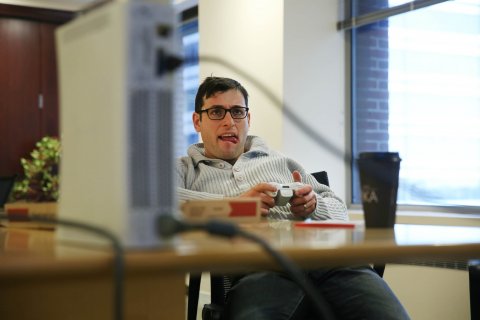
Advanced Warfare takes place in 2054, an imagined future that makes 2014 seem like a peaceful, pastoral spell. Other than the pristine headquarters of the Atlas Corporation, everything looks bombed out. Bike lanes have disappeared from Western civilization, as have farmers markets and gastropubs. You can thank the KVA for that. The game features soldiers made almost bionic by the surfeit of technology grafted onto their bodies: kind of like RoboCop, but a lot more limber, and minus the silly visor. At one point, my team conducted surveillance with drones that mimic insects (not much of a fantasy, actually). Other drones, which I piloted, are both bigger and deadlier, letting you pound away at the villains from above. The profusion of sophisticated weaponry would make even Wayne LaPierre think twice about the Second Amendment. One thing hasn't changed, though: Detroit is still a mess. Guess the hipster farmers didn't save Motown, after all.
Here comes a grenade of a disclaimer: I know shit about video games. Jack shit, even. I played Grand Theft Auto once, at the apartment of a novelist who, in more auspicious times, had been compared by Michiko Kakutani of the Times to Toni Morrison. I found his interest in the game discomfiting and counterproductive, while the game itself, with its pimps and hookers and crackheads and gangbangers, needlessly lascivious and needlessly complex, utterly lacking in moral core (the same charge Tolstoy made about Shakespeare, whose lesser tragedies do have a madcap, GTA quality to them). I missed the days of Duck Hunt, on which I am convinced all first-person shooters are still premised: open revelry in the fantasy of killing living things, whether mallards of terrorists or loose-tongued junkies prowling Venice Beach. The same fantasy had propelled my slightly more mature adoration for Wolfenstein 3D and Doom, both classics of the early 1990s, pairing perfectly with Rage Against the Machine and a Twizzler-induced sugar high. You kept killing and shooting until you'd satisfied a bloodlust you did not even know you had, a bloodlust ancient and unspeakable, the bloodlust of half-upright hominids warring on ancient plains, wielding clubs and rejoicing at the sight of splattered brains and gushing blood. Nothing was as thrilling as the next level, the last life left, the final ammo clip, which might just get you to the next level, to enlightenment, redemption, victory.
The last game I had seriously played was GoldenEye 007, which kept me good company (too good, probably) during the beery miasma of early college. But once I got at least somewhat more serious about school, I booted James Bond from my filthy dorm room and didn't play video games at all for the next decade and a half, other than the very occasional, very ironic session of Big Buck Hunter in some wood-paneled Brooklyn bar where Franz Ferdinand played too loudly, and the aforementioned episode at the apartment of the novelist who didn't quite live up to the promise of his early work and was now slinking around South Beach, robbing dealers and holding up check-cashing joints, racking up points in GTA while losing out on Pulitzers and such.
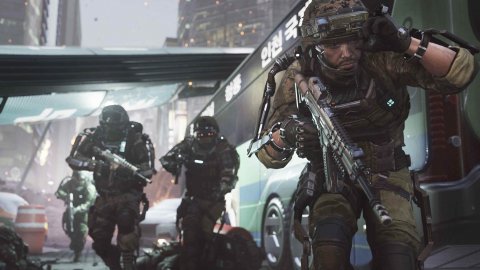
But the greater culture has not shared my indifference to video games. If anything, video games have become ever more relevant: not quite high art, but clearly art of some kind. Arguing in favor of the medium's relevance is no longer just the job of obscure theorists in digital studies departments eager for attention from more sober-minded colleagues. If Matthew Barney's queasy schlock deserves display at the Guggenheim Museum, then I'm willing to consider the intellectual valence of Halo. In 2012, the Smithsonian American Art Museum held an exhibition called The Art of Video Games. The show's organizer, Chris Melissinos, suggested that video games were a superior form of art to literature: "In books, everything is laid before you. There is nothing left to discover. Video games are the only forms of artistic expression that allow the authoritative voice of the author to remain true while allowing the observer to explore and experiment."
Huh. I think there's plenty of mystery in, say, John le Carré's The Spy Who Came In From the Cold or Donna Tartt's The Secret History, but I knew it was finally time to squeeze the joystick once again. I settled on Call of Duty: Advanced Warfare because, frankly, it was the fall's newest and shiniest thing, but also because first-person shooters remain the most primal gamer experience, offering access to the most taboo of all human activities. Don't get me wrong, I like urban planning and professional basketball. Those, though, are realms relatively accessible in the everyday world: I may not make the Knicks (then again, these days…), but I can watch them play from 50 feet away at Madison Square Garden, should the masochistic impulse strike. And after a while, SimCity starts to feel like a graduate school exercise. I mean, have our fantasies become so pedestrian that the construction of waste transfer stations passes for a thrill? But beating back a terrorist group hell-bent on destroying Seattle with a nuclear criticality? That, you can't get anywhere else. And so you play.
Oh, poor Seattle. We didn't quite save you, after all, but the crisply cinematic shots of our helicopters swooping through the amber light of Puget Sound, toward the smoking cooling towers of a nuclear power plant, do provide a special kind of thrill, one tied to a sense of responsibility. You are on a mission, and are a missionary of sorts, though not exactly the peaceful kind. You have been called. And when your boss is Kevin Spacey (he voices the quietly creepy Atlas chief Jonathan Irons, the father of one of your fallen Marine comrades from the South Korean campaign), you don't want to disappoint him. What's really at the heart of these first-person shooters is a moral impetus, a calling to save the United States, or the entire free world—not just, as in Grand Theft Auto, to selfishly score a kilo of coke. When playing Call of Duty, you are in the grip of Shakespeare's famous words, as uttered by Henry V: "Once more unto the breach, dear friends, once more."

And unto the breach I gladly went. Because Advanced Warfare directs you from objective to objective with gentle reminders of where to go and what to do, a novice like myself can learn to play with relative ease (I tried only the single-player mode, though multiplayer mode is available). While there are plenty of sophisticated guns and gadgets to be used in the service of promulgating freedom, I refused to take the geek's approach to the game. I wanted only to be the soldier exploring the ruins of Detroit, racing along a highway in Nairobi, wandering through a war-torn Seoul (the game begins with an invasion of South Korea by its kooky northern neighbor), shooting baddies just as I had once shot duckies. Pow, pow. Oh, yeah.
Some have blamed first-person shooters for the proliferation of school shootings, and there may indeed by troubled minds for whom Call of Duty could ostensibly serve as a call to something more sinister. But such minds need salvation that goes beyond unplugging an Xbox. Violent games are a convenient excuse, but probably not a very accurate one. At the very least, they won't harm mature adults much beyond contributing to a Vitamin D deficiency. You can always pop a pill for that.
For me, Call of Duty proved cathartic. No, not quite in the classic Aristotelian way, but as a nevertheless valid means of releasing the small-scale annoyances that accumulate during daily life: a sort of enema of the prefrontal cortex, a dispensation of every annoyance from the moment you step on a crowded Q train and someone unfolds a New York Times right into your somnolent mug. In fact, there is some serious thought that virtual-reality games can be used to treat PTSD. Other therapeutic uses for video games have also been explored.
So maybe Call of Duty is good for you after all, like spin class and kale. And while gaming is easily dismissed as a juvenile distraction, Advanced Warfare presents a vision of the world that is significantly more sane than Oliver Stone's latest exercise in fact-lite paranoia (or as he calls it, "history"). The game immerses you in a world that is both entirely fictional and entirely real; it poses moral quandaries and, best of all, holds your attention. Hell, it was fun while it lasted, even if my eyeballs were ready to pop out of their sockets after two solid days of gaming. And when you're done, the game deposits you back into the world, the world without sonic cannons or bionic arms—or, well, sonic cannons and bionic arms readily available for your use. A world where Kevin Spacey is just a sleazy Capitol Hill macher, not a commander of the world's largest private army. Phew.



